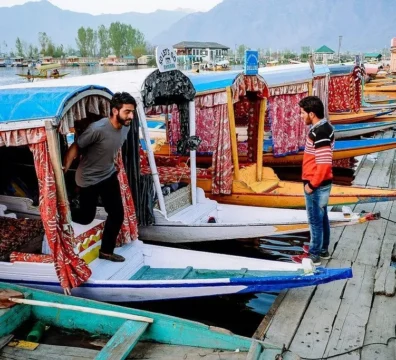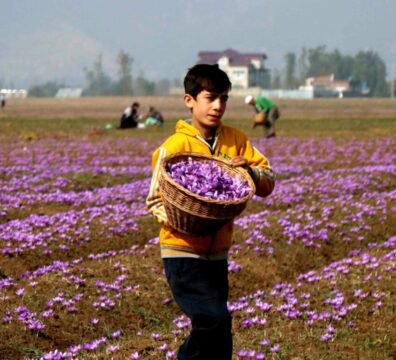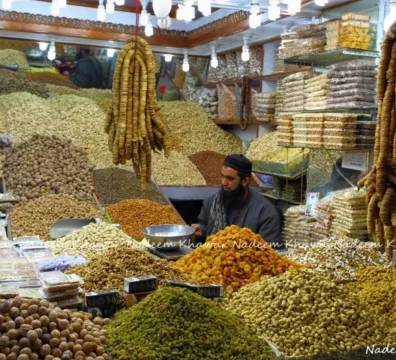Occupation
Kashmiri people engage in a diverse range of livelihoods, largely influenced by the region’s geography, culture, and historical factors. The primary sources of income and livelihoods in Kashmir have evolved over centuries, adapting to the changing economic landscape.
Agriculture is one of the mainstays of the Kashmiri economy. The fertile soils of the Kashmir Valley support the cultivation of a variety of crops, including rice, wheat, barley, saffron, apples, cherries, and apricots. The terraced fields and orchards that blanket the landscape contribute significantly to the region’s agricultural output. Kashmir is known for its lush orchards, particularly apple and cherry orchards. The apples of Kashmir are highly sought after for their quality and flavor. Fruit cultivation and harvesting provide livelihoods for many Kashmiri families, both as farm owners and laborers.
The breathtaking natural beauty of Kashmir has made it a popular tourist destination. Tourism is a significant source of income for the local population, with activities ranging from houseboat stays on Dal Lake to trekking in the Himalayas. Tourism-related businesses, such as hotels, restaurants, and handicraft shops, offer employment opportunities to many residents.
Kashmiri handicrafts are renowned for their artistry and craftsmanship. Skilled artisans create exquisite products like Pashmina shawls, intricately woven carpets, and finely detailed papier-mâché items. These crafts provide income to numerous families in the region, contributing to the preservation of cultural traditions.
Livestock farming, including the rearing of cattle, sheep, and goats, is another vital source of livelihood in Kashmir. Dairy farming and the production of wool, meat, and dairy products sustain many rural households.
The region’s strategic location along historical trade routes has contributed to its role as a center of trade. Srinagar, the capital of Jammu and Kashmir, serves as a commercial hub. Wholesale markets, retail shops, and small businesses provide employment and income opportunities.
Many Kashmiris work in various government departments and agencies, serving as teachers, healthcare workers, administrators, and civil servants. Government jobs offer job security and stable incomes.
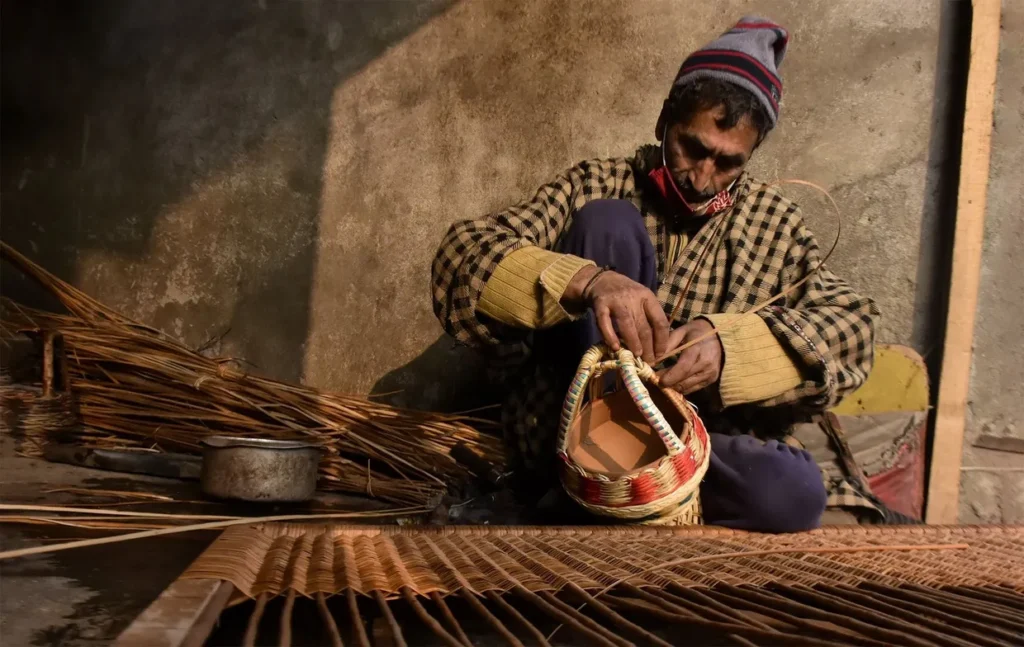
The education sector has grown significantly in recent years, leading to employment opportunities in schools, colleges, and universities. Additionally, healthcare services, including doctors, nurses, and paramedics, play a crucial role in the region’s economy.
The movement of goods and people within and outside the region is facilitated by a network of roadways and transportation services. Truck drivers, transport operators, and laborers involved in logistics contribute to the transport sector’s economic significance.
Kashmiri people engage in a variety of livelihoods that are deeply intertwined with the region’s natural resources, cultural heritage, and economic opportunities. While agriculture and horticulture remain foundational to the Kashmiri economy, tourism, handicrafts, and government employment also play pivotal roles in sustaining the livelihoods of the local population. The diversity of economic activities reflects the resilience and adaptability of the Kashmiri people in the face of unique geographical and historical challenges.
Let’s Talk Library
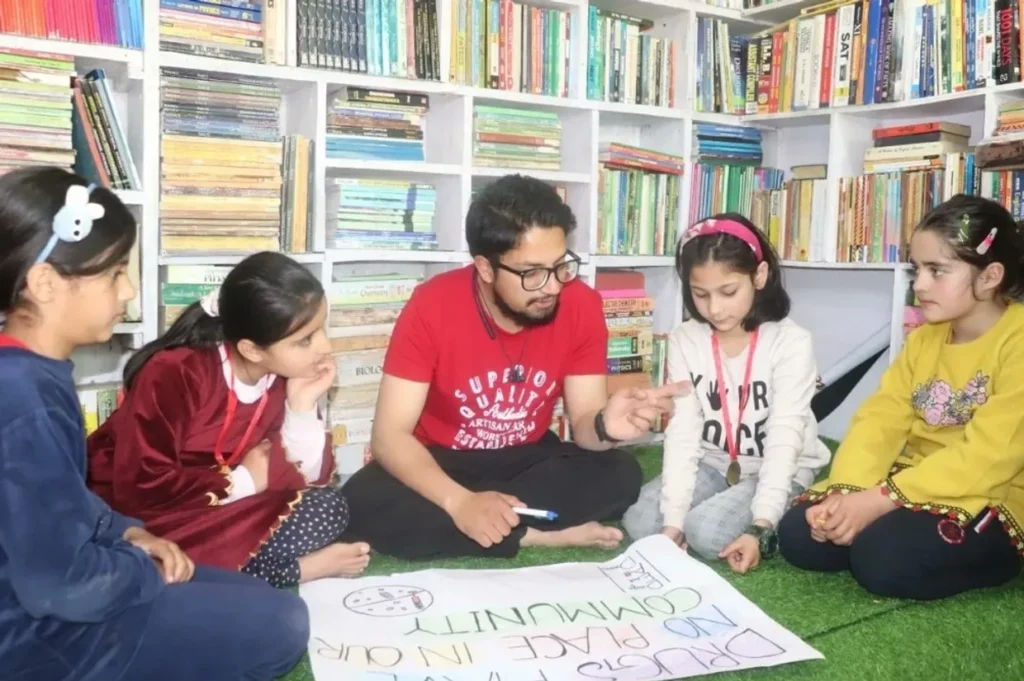
An Innovative Free Library Initiative
- Over the years, libraries have enormously supported the spread of knowledge and education. They bridged the gap to meet essential requirements of people in search of self-development, academic skill and competency. Libraries present in sensitive institutions have aided in bringing about a change in behavior of prisoners, patients admitted to Rehabilitation Centres as well as elderly people living in old age homes. Libraries facilitate learning, acquisition of knowledge, create rational and civic sense. Libraries over centuries have been a cove of knowledge, scientists were aided by these knowledge troves and were able to invent and make thousands of discoveries for mankind.
- Free space and a viable environment for preparation of various competitive exams are necessary. Its criticality is unending for a true aspirant given that successful candidates spend most of their time reading books in libraries. Keeping in view the importance of books, Mubashir Mushtaq independently established a free library in his village. He belongs to Halmathpora which is a remote village of Kupwara in North Kashmir. Lack of access to books had forced the majority of children in his village to abandon their education. Mubashir motivated himself to run a full-fledged campaign against child labor and made a resolve to provide free books to those who were unable to afford them and left their studies midway. He understood that the need for free space is indispensable for fostering the learning process in his remote village. He has set an outstanding example for fellow Kashmiri youth to contribute positively towards society by taking up a stand for social causes and fighting against social evils.
- The idea of establishing a library struck him when he saw the children from his neighboring villages struggling in apple orchards & crop fields. He was distraught and felt concerned about their future. Post this incident, his research lead him to the conclusion that lack of access to books had forced children to abandon their education. Motivated by this revelation, he initiated a campaign against child labor and during Covid-19 pandemic established a free library. It steadily started to gain momentum.
- It took him one and a half year to assemble books from his mates, college professors, reputed personalities from Kupwara and his hometown. The donations that he received from people aided him to lay the foundation for ‘Let’s Talk Library‘ in July 2022. Mubashir Mushtaq is pursuing Honors in Bio-Chemistry at Shri Pratap College Srinagar. ‘Let’s Talk Library’ not only provides study material but also serves as a platform for other humanitarian works like ‘Our Kids Our Future’.
- On every Sunday children gather at library, engage in different activities which promote their personality development, English language skills and public speaking abilities. Besides this, they get to involve in brain storming sessions and learning body language skills. These initiatives also help children in promoting their writing and verbal skills.
- Such initiatives require massive commendation around every nook and corner of Kashmiri civil society. These have potential to change the perception of people towards positive developments happening around. This library is not only a store house of books but also a place to discuss various problems faced by the villagers.
- Every second person visits it by taking out some time off from his/her busy schedule to gain some or other kind of information. The area has earned good name due to such initiatives. Youth from neighboring villages also visit the library and get to read and study. Every kind of book has been made available by the village elders, in order to help Mubashir to realize his dream of making good future of his remote region.
- Gone are the days when separatists would lure gullible youth of valley towards stone pelting and anti-national activities. Realization into nation building is now trending, proven by the fact that every second day, Kashmiri youth are bringing laurels for their region and country in particular.
- Maiden effort into making something happen in a traditional society needs utmost motivation and constant encouragement. It needs resources to run such campaigns and require great degree of effort to survive such initiatives. There is scope for more such initiatives to guide our youth who were earlier misguided by inimical elements.
- Government can also play its part in helping them with logistics and infrastructural support. We are witnessing a period in Kashmir, in which poverty-stricken youth are cracking NEET, UPSC and other competitive exams. Recently a painter from Pulwama cracked NEET UG 2023 after spending his day laboring in orchards and painting window sills as overtime to resuscitate his education and fulfill family responsibilities.
- One is indeed fortunate to see this revolution shaping up in Kashmir in educational field having its roots in these initiatives which encourage other youth to work hard and dream big. Perception of people especially youth is bound to these welfare measures pressed by humanitarian causes and ethical dealings.
